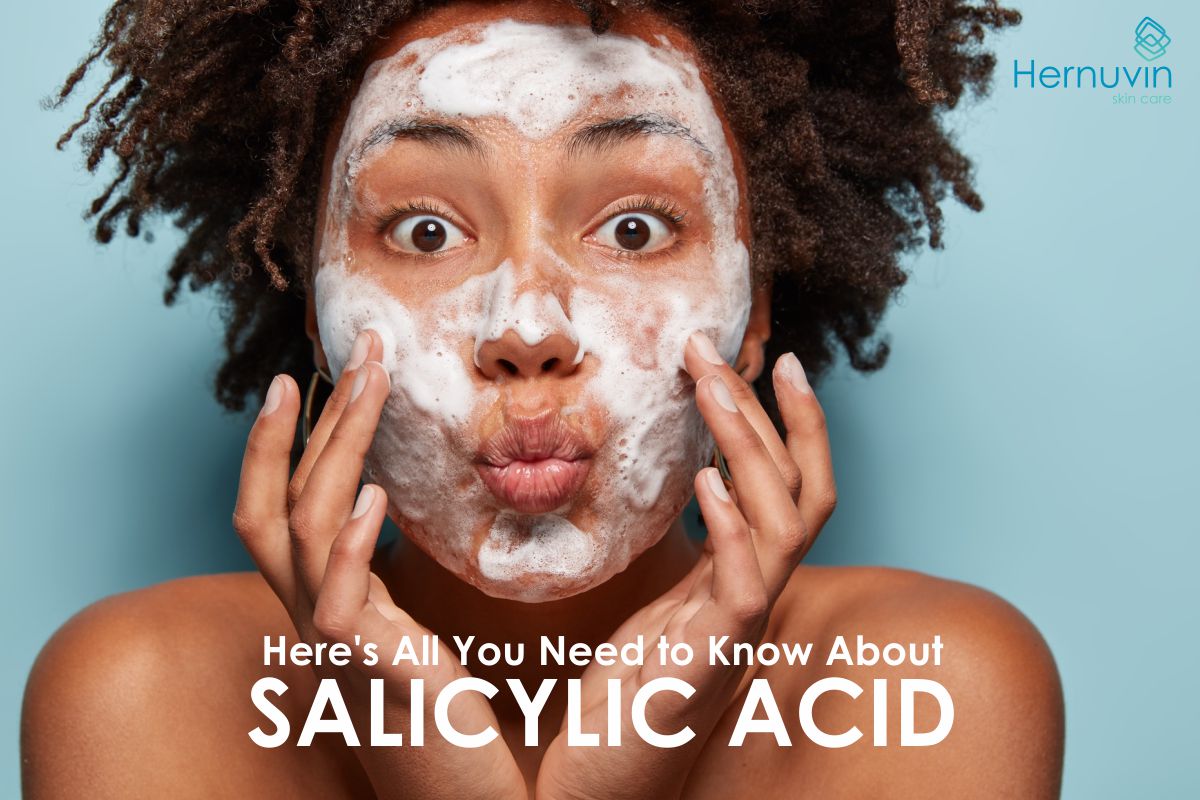Salicylic acid in skin care. What is it and why is it such an effective ingredient in our skin cleansing product, Hernuvin Wash?
Over the years, I’ve tried several different facial cleansers. I’m always looking for something gentle that won’t dry out my sensitive skin. My friend recommended Hernuvin Wash containing salicylic acid, and fortunately, it helped. No more dry skin, breakouts, redness, nor stinging eyes (a major bonus for me!).
My friend also told me that I didn’t need to exfoliate my skin, use a toner or make-remover because Hernuvin Wash would do it all for me. I was like, “What!” No toner (my beloved rose water) or routine exfoliation… mmm, I was not so sure… but I ditched my routine for a few weeks, and now we are into the third month, and my skin is happier and healthier. And I am loving the simpler routine.
This Got Me Curious About Salicylic Acid
Why is it such an effective ingredient? According to Dr Hugo Nel, creator of Hernuvin, salicylic acid is keratolytic. It is a type of compound that breaks down the outer layer of the skin to make it easier to exfoliate dead skin cells and encourage cellular turnover.
Normally found in acne cleansers, spot treatments, toners, serums, and peels, it is an oil-soluble ingredient, that penetrates skin cells deep beneath the surface of the skin. It removes impurities that clog the pores (ultimately leading to whiteheads, blackheads, and pimples – urgh!). Part of the cleansing process includes removing excess sebum from pores. This helps to reduce oiliness and combat acne.
So What Is Salicylic Acid?
Here’s the science of it all. Salicylic acid is a naturally occurring molecule derived from the bark of willow trees. It is part of a class of acids called beta-hydroxy acids, or BHAs. It is known for its ability to help exfoliate and slough away dead skin cells from the skin’s surface.
When it comes to skin care, you’ll either run into Alpha Hydroxy Acids (AHAs) or Beta Hydroxy Acids (BHAs). BHA’s like salicylic acid are more oil-soluble, and AHA’s are more water-soluble. BHA’s easily break through the skin cells lipid layers and penetrate the skin at a deeper level than water-soluble products.
What Does Salicylic Acid Do For the Skin?
Because salicylic acid can penetrate deeply into the skin and go beyond just the surface layer, it’s a powerful skin cleansing ingredient. The acid part of the molecule can break down and loosen the desmosome (the proteins that hold cells together) making it easier for the product to exfoliate and cleanse any impurities that are clogging the pores.
But exfoliating dead skin cells and clearing out clogged pores are not the only benefits of salicylic acid. Other benefits include minimising the look of pores, reducing inflammation, and preventing breakouts.
Which Skin Types Should Use Salicylic Acid?
While salicylic acid is good for any skin type, people who have acne-prone and oily skin will benefit the most from this ingredient. Why? It has anti-inflammatory properties that help to soothe irritation, combat acne problems and prevent new breakouts.
It’s also restores skin damaged from cancer treatment as it soothes sensitivity and calms burnt and inflamed skin.
How Often Should You Use Products Containing Salicylic Acid?
How often you use salicylic acid depends on what kind of product you are using. If salicylic acid is an ingredient in your cleanser, like Hernuvin Wash, it is fine to use it every day (twice a day).
However, if you are using an exfoliant with salicylic acid in the formula, you should only use the product three times per week. This will help to avoid over-exfoliating the skin and drying it out. However using Hernuvin Wash means you don’t need to use an exfoliant or worry about it drying out your skin from over-usage.
Does Salicylic Acid Have Any Side Effects?
In general, salicylic acid is safe to use on all skin types and should not cause any negative reactions.
In Conclusion
I highly recommend Hernuvin Wash. My daughter (25), has also started using the product and loves it. She has seen a significant improvement in her skin; and now also uses the Hernuvin Moisturiser and Hernuvin Retinol Serum. I use the same plus the Hernuvin Eye Cream. I’ll share more about our first-hand experience and why we are big fans of Hernuvin.
[su_divider width=”full”]
WHY HERNUVIN SKIN CARE
[su_quote]The Hernuvin range is all about trying to help people address a true need, a need that is not necessarily only cosmetic or aesthetic.” – Dr Hugo Nel[/su_quote]
Medically designed and scientifically formulated by a specialist plastic surgeon (whose anaesthetist is a breast cancer survivor), Hernuvin is specifically formulated to address the side effects of Chemotherapy and traumatised skin.
Whether your skin is normal, showing the signs of ageing or recovering from the effects of chemotherapy and estrogen depletion, the Hernuvin Skin Care Range offers a simple skin care regime that facilitates the restoration of ailing skin, as well as providing effective prevention and protective assistance for all skin types.
[su_button url=”https://www.hernuvin.com/shop/” background=”#66c3bb” icon=”icon: heart”]Find out more about our skin care range[/su_button]
[su_divider width=”full”]
Article References
Dr Hugo Nel, plastic and reconstructive surgeon & creator of Hernuvin Skin Care Range
Hernuvin’s cosmetologist, Liri Victor

